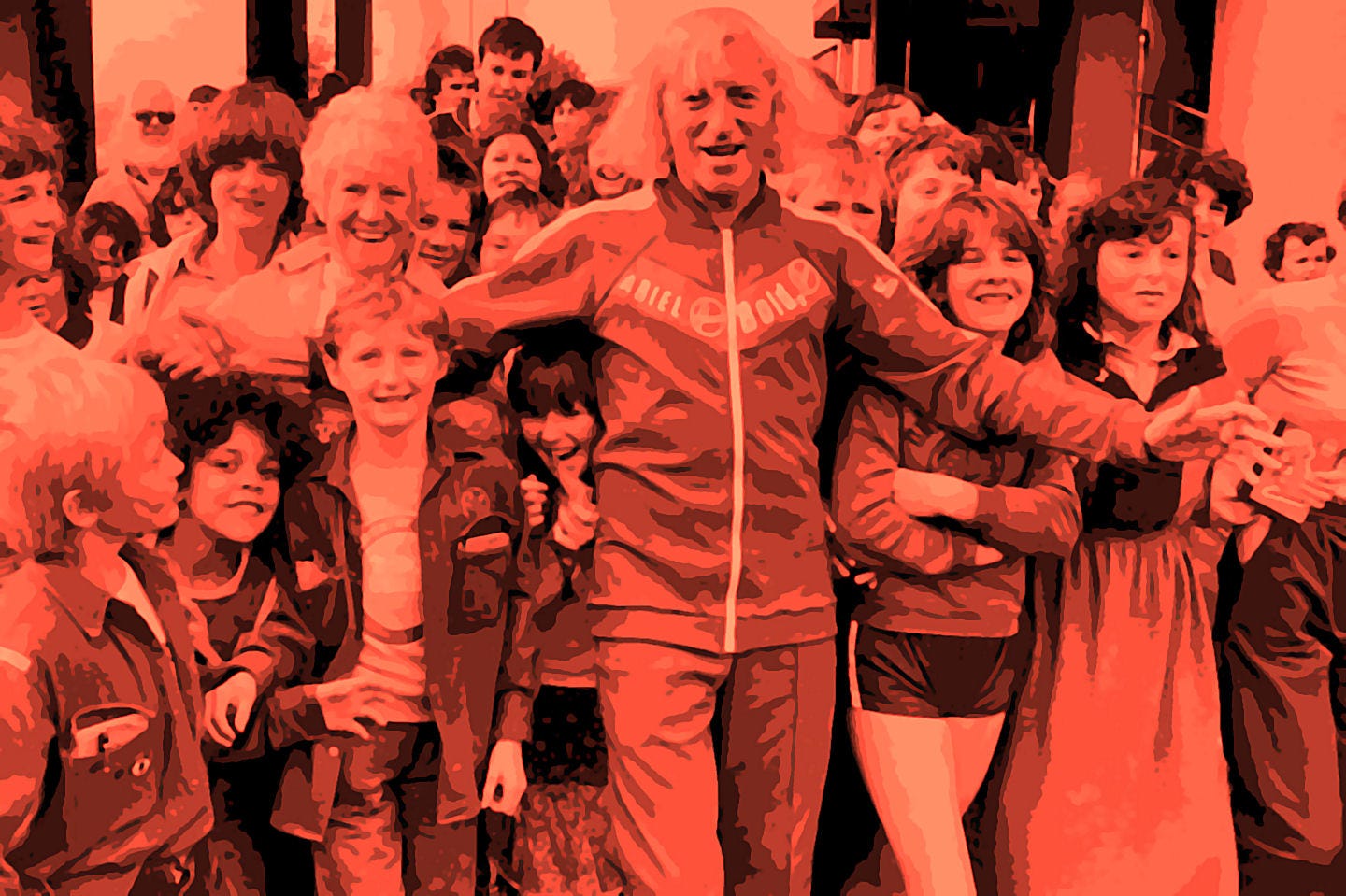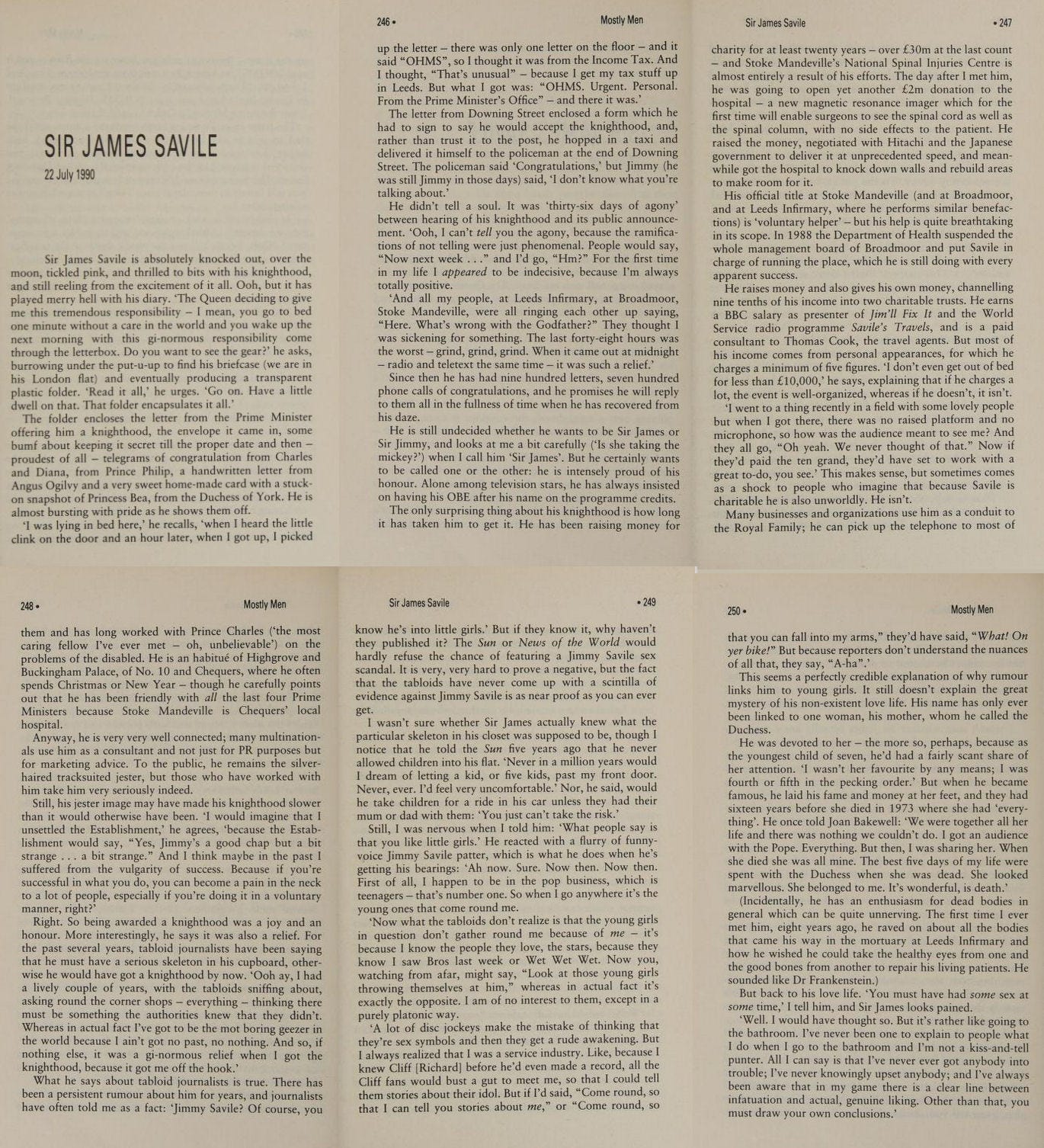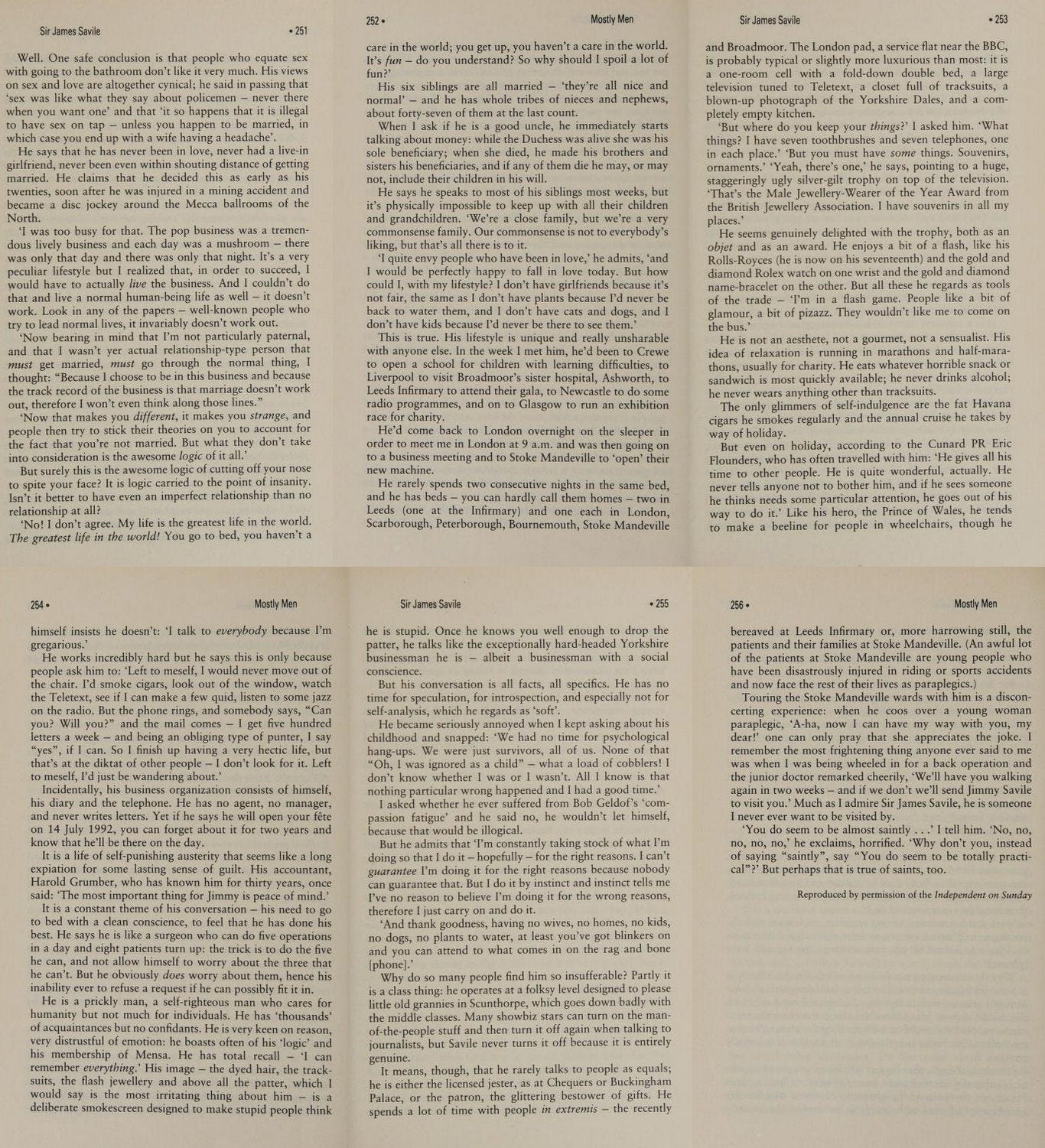This piece needs little introduction. It speaks volumes for how an agent of the superculture moves through the world, how he disguises himself within the culture, how that culture perceives, presents and enables him, and how the supercultral agent perceives and presents himself.
Screenshots from the book Mostly Men, by Lynn Barber. Full text below, with bolded sections.
Sir James Savile is absolutely knocked out, over the moon, tickled pink, and thrilled to bits with his knighthood, and still reeling from the excitement of it all. Ooh, but it has played merry hell with his diary. “The Queen deciding to give me this tremendous responsibility—I mean, you go to bed, one minute without a care in the world and you wake up the next morning with this gi-normous responsibility come through the letterbox. Do you want to see the gear?” he asks, burrowing under the put-you-up to find his briefcase (we are in his London flat) and eventually producing a transparent plastic folder. “Read it all,” he urges. “Go on. Have a little drill on that. That folder encapsulates it all.”
The folder encloses the letter from the Prime Minister offering him a knighthood, the envelope it came in, some bumf about keeping it secret till the proper date and then—proudest of all—telegrams of congratulation from Charles and Diana, from Prince Philip, a handwritten letter from Angus Ogilvie and a very sweet homemade card with a stuck-in snapshot of Princess Bea, from the Duchess of York. He is almost bursting with pride as he shows them off.
“I was lying in bed here,” he recalls, “when I heard the little clink on the door and an hour later, when I got up. I picked up the letter—there was only one letter on the floor—and it said ‘OHMS,’ so I thought it was from the Income Tax. And I thought, “That’s unusual”—because I get my tax stuff up in Leeds. But what I got was “OHMS. Urgent. Personal. From the Prime Minister’s Office”—and there it was.
The letter from Downing Street enclosed a form which he had to sign to say he would accept the knighthood, and, rather than trust it to the post, he hopped in a taxi and delivered it himself to the policeman at the end of Downing Street. The policeman said “Congratulations,” but Jimmy (he was still Jimmy in those days) said, “I don’t know what you’re talking about.”
He didn’t tell a soul. It was “thirty-six days of agony” between hearing of his knighthood and its public announcement. “Ooh I can’t tell you the agony, because the ramifications of not telling were just phenomenal. People would say, ‘Now next week . . .’ and I’d go, ‘Hm?’ For the first time in my life I appeared to be indecisive, because I’m always totally positive.
“And all my people, at Leeds Infirmary, at Broadmoor, Stoke Mandeville, were all ringing each other up saying, ‘Here. What’s wrong with the Godfather?’ They thought I was sickening for something. The last forty-eight hours was the worst—grind, grind, grind. When it came out at midnight—radio and teletext the same time—it was such a relief.”
Since then he has had nine hundred letters, seven hundred phone calls of congratulations, and he promises he will reply to them all in the fullness of time when he has recovered from his days.
He is still undecided whether he wants to be Sir James or Sir Jimmy, and looks at me a bit carefully (“Is she taking the mickey?”) When I call him “Sir James.” But he certainly wants to be called one or the other: he is intensely proud of his honour. Alone among television stars, he has always insisted on having his OBE after his name on the programme credits.
The only surprising thing about his knighthood is how long it has taken him to get it. He has been raising money for charity for at least twenty years—over £30 million at the last count—and Stoke Mandeville’s National Spinal Injuries Centre is almost entirely a result of his efforts. The day after I met him, he was going to open yet another £2m donation to the hospital—a new magnetic resonance imager which for the first time will enable surgeons to see the spinal cord as well as the spinal column, with no side effects to the patient. He raised the money, negotiated with Hitachi and the Japanese government to deliver it at unprecedented speed, and meanwhile got the hospital to knock down walls and rebuild areas to make room for it.
His official title at Stoke Mandeville (and at Broadmoor, and at Leeds Infirmary, where he performs similar benefactions) is “voluntary helper”—but his help is quite breathtaking in its scope. In 1988 the Department of Health suspended the whole management board of Broadmoor and put Savile in charge of running the place, which he is still doing with every apparent success.
He raises money and also gives his own money, channelling nine-tenths of his income into two charitable trusts. He earns a BBC salary as presenter of Jim’ll Fix It and the World Service Radio programme Savile’s Travels, and is a paid consultant to Thomas Cook, the travel agents. But most of his income comes from personal appearances, for which he charges a minimum of five figures. “I don’t even get out of bed for less than £10,000,” he says, explaining that if he charges a lot, the event is well organised, whereas if he doesn’t, it isn’t.
“I went to a thing recently in a field with some lovely people but when I got there, there was no raised platform and no microphone. So how was the audience meant to see me? And they all go, “Oh yeah! We never thought of that.” Now if they’d paid the ten grand, they’d have set to work with a great to-do, you see. This makes sense, but sometimes comes as a shock to people who imagine that because Savile is charitable he is also unworldly. He isn’t.
Many businesses and organizations use him as a conduit to the Royal Family. He can pick up the telephone to most of them and has long worked with Prince Charles (“the most caring fellow I’ve ever met—oh, unbelievable”) on the problems of the disabled. He is an habitué of Highgrove and Buckingham Palace, of No. 10 and Chequers, where he often spends Christmas or New Year—though he carefully points out that he has been friendly with all the last four Prime Ministers because Stoke Mandeville is Chequers’ local hospital.
Anyway, he is very well-connected; many multinationals use him as a consultant and not just for PR purposes but for marketing advice. To the public, he remains the silver-haired tracksuited jester, but those who have worked with him take him very seriously indeed.
Still, his jester image may have made his knighthood slower than it would otherwise have been. “I would imagine that unsettled the Establishment,” he says, “because the establishment would say, ‘Yes, Jimmy’s a good chap but a bit . . . strange . . . a bit strange.’ And I think maybe in the past I suffered from the vulgarity of success. Because if you’re successful in what you do, you can become a pain in the neck to a lot of people, especially if you’re doing it in a voluntary manner, right?”
Right. So being awarded a knighthood was a joy and an honour. More interestingly, he says it was also a relief. For the past several years, tabloid journalists have been saying that he must have a serious skeleton in his cupboard, otherwise he would have got a knighthood by now. “Ooh I, I had a lively couple of years, with the tabloids sniffing about. Asking round the corner shops—everything—thinking there must be something the authorities knew that they didn’t. Whereas in actual fact I’ve got to be the M.O.T. boring geezer in the world because I ain’t got no past, no nothing. And so, if nothing else, it was a ginormous relief when I got the knighthood, because it got me off the hook.”
Free articles happen whenever there is an overall weekly increase of 3+ paid subscribers. If/when the total number reaches 200, all written content will be free for as long as it stays there. I am not greedy or seeking endless expansion, only consistency of income.
There is 20% off for multiple submissions. Contact me for details.







